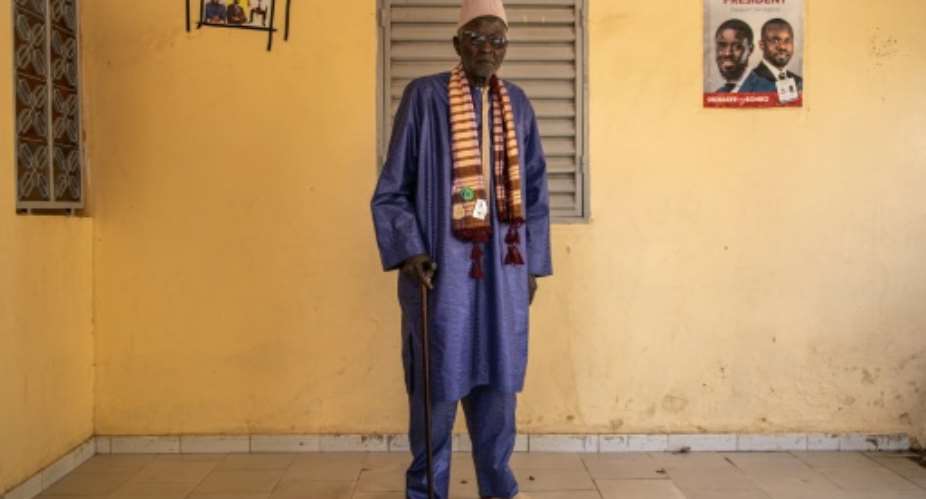In Ndiaganiao, a remote village in Senegal's agricultural region, men from around the country flock to congratulate the father of president-elect Bassirou Diomaye Faye.
Speaking from the hallway of the pastel-coloured family home and dressed in a silk blue boubou, 84-year-old Samba Faye says he is "happy and proud" of his son.
"He came to see me before the election, crouched at my feet and asked that I pray for this success," Faye said as men come up to greet him while others hand him buzzing telephones.
"We could never have imagined that he would one day become president of the republic even though we prayed that he would go as far as possible in his career," added Faye.
"Bassirou has always been a serious and ambitious boy."
'High hopes'
Just 10 days after he was freed from prison, the anti-establishment candidate Diomaye -- who comes from an educated but modest family background -- won the presidential election in the first round, gaining 54.28 percent of the vote.
The 44-year-old, who has said he wants a "break" with the current political system, is set to become the youngest president in Senegal's history.
"I asked him to do everything to satisfy the Senegalese people" who "have high hopes" of him, Faye, who worked in the agricultural sector training farmers how to use new equipment, told AFP.
"I told him that a great responsibility now rests on his shoulders."
Outside the house, little girls play barefoot in the dusty allies in front of buildings from another age where old wooden doors and others made of rusty metal still stand.
 Ndiaganiao is a remote village in Senegal's western agricultural region. By JOHN WESSELS (AFP)
Ndiaganiao is a remote village in Senegal's western agricultural region. By JOHN WESSELS (AFP)
Across Ndiaganiao, where Diomaye won 80 percent of the vote, walls and dilapidated buildings have his name and that of his mentor Ousmane Sonko written in white paint.
The uncle of the new president and his namesake Diomaye Faye said that running as leader wasn't his nephew's intention.
"It wasn't actually his goal. He never really intended to get involved in politics but his friend Ousmane Sonko... drew him into politics," said his uncle, a political science professor in the United States who said he spent two years with pan-Africanist leader Thomas Sankara from 1985 to 1987.
"The main advice we can give him is... remaining himself, being humble and keeping his ability to listen," the uncle added.
'Little shepherd'
At the local headquarters of Faye's party, PASTEF, the walls are covered with posters of the new president.
Mor Sarr, who introduces himself as Faye's best friend and an official at PASTEF, confides that he watched over the voting to avoid any electoral fraud.
He remembers playing football "on sandy pitches delineated by stones" with Faye and sharing food when they had little money as students.
The two met at school aged 11 and went on to share a room from 2001 to 2004 at the University of Dakar.
"Diomaye has always been very close to his mother, Khady Diouf, whom he used to help with the household chores after school. Diomaye was also a little shepherd who looked after his goats," Sarr said.
 Critical infrastructure is needed in the incoming president's home village, including a health clinic and paved roads. By JOHN WESSELS (AFP)
Critical infrastructure is needed in the incoming president's home village, including a health clinic and paved roads. By JOHN WESSELS (AFP)
"With all the twists and turns that events have taken, this really is a consecration of a long democratic struggle, of a truly loyal conquest of power," he added.
Outside the PASTEF building, shopkeepers wait for customers after setting up their carts full of fruits and vegetables under trees.
The locals travel around mainly on foot or by horse-drawn carts while some own cars that kick up clouds of orange dust as they go by.
The village is in need of critical infrastructure including paved roads and a health clinic.
One shopkeeper, Fabienne Dione, told AFP that the locals expect the new president to make changes.
"We expect a lot from him. The village for example needs a hospital. He also needs to invest in education to give our children a chance of succeeding," she said.





 We saved $57.9million from procurement of new verification devices, registration...
We saved $57.9million from procurement of new verification devices, registration...
 Ejisu by-election: Aduomi is a betrayer – Ahiagbah
Ejisu by-election: Aduomi is a betrayer – Ahiagbah
 Dumsor: I’ll be in police custody if I speak, I vex — DKB
Dumsor: I’ll be in police custody if I speak, I vex — DKB
 We'll give daily evidence of Akufo-Addo's supervised thievery from our next gene...
We'll give daily evidence of Akufo-Addo's supervised thievery from our next gene...
 Asiedu Nketia crying because they've shared the positions and left him and his p...
Asiedu Nketia crying because they've shared the positions and left him and his p...
 Mahama's agenda in his next 4-year term will be 'loot and share' — Koku Anyidoho
Mahama's agenda in his next 4-year term will be 'loot and share' — Koku Anyidoho
 If you're president and you can't take care of your wife then you're not worth y...
If you're president and you can't take care of your wife then you're not worth y...
 Foreign Ministry caution Ghanaians against traveling to Northern Mali
Foreign Ministry caution Ghanaians against traveling to Northern Mali
 GHS warns public against misuse of naphthalene balls, it causes newborn jaundice
GHS warns public against misuse of naphthalene balls, it causes newborn jaundice
 Our education style contributes to unemployment - High Skies College President
Our education style contributes to unemployment - High Skies College President
